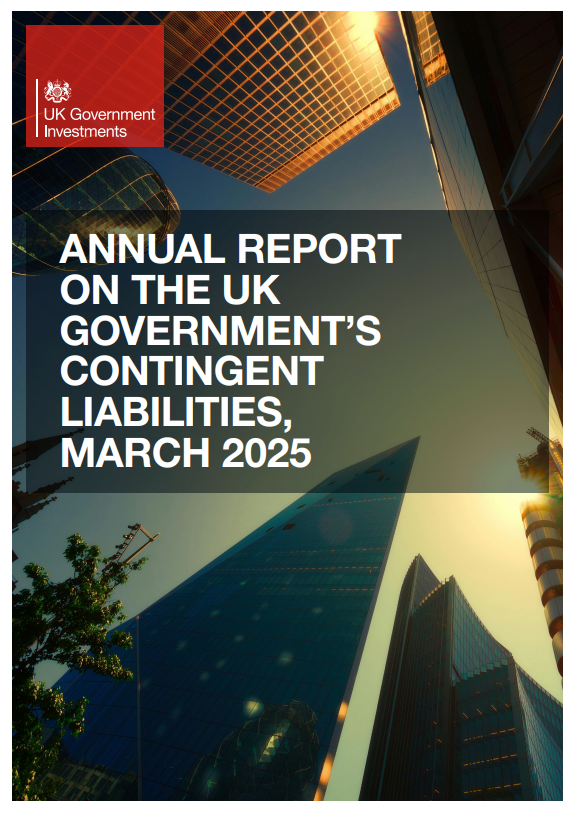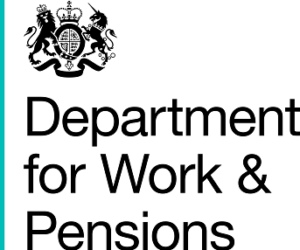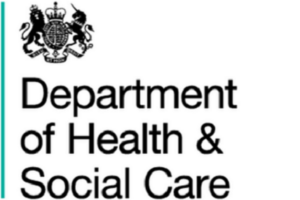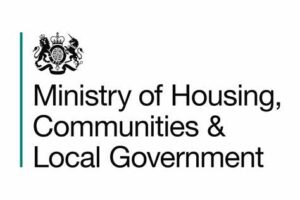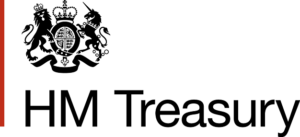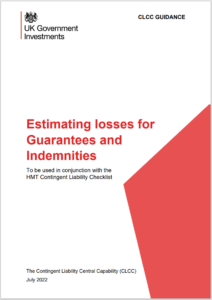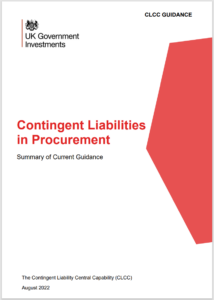Advise on and analyse the UK government’s financial instruments and transactions
The Financial Instruments and Transactions Advisory Group (FInTAG) is an analytical and advisory unit within UK Government Investments (UKGI). The FInTAG has been established to strengthen expertise on contingent liabilities, loans and equity investments within government.
What is a financial instrument or transaction?
FInTAG advises on different types of financial instruments and transactions, namely contingent liabilities, loans and equity investments. Governments can use these financial instruments and transactions to support strategic objectives, deliver policies and to address market failures.
What are contingent liabilities?
A contingent liability represents a government commitment to possible future expenditure if specific conditions are met or unforeseen events occur, such as loan guarantees (where government agrees to pay the debts of a third party if they default, such as the Export Development Guarantee (EDG) schedule run by UK Export Finance) and indemnities (protection similar to insurance where government agrees to cover costs such as clinical negligence claims against NHS GPs).
What are loans?
A loan is a financial arrangement in which a lender provides money to a borrower, with the expectation of repayment over time, typically with interest. They can play a key role in financing: businesses (e.g., expansions, acquisitions, or working capital); infrastructure projects; or personal needs (e.g., mortgages, student loans).
Government institutions such as UK Export Finance and the British Business Bank have used loans to support thousands of businesses to expand into new markets and invest in new technologies.
What are equity investments?
Equity refers to an investment in the capital of a company, the value of which can increase or decrease depending on the businesses expected performance. Equity investments can be used to help achieve specific policy or strategic goals, such as supporting financial stability (e.g., shares in NatWest Group plc.) or supporting innovation and growth.
Why are financial instruments and transactions important?
Economic growth is the central mission of the government. For the private sector to have the confidence to invest and innovate, public investment must play its part alongside.
At Autumn Budget 2024 the Chancellor announced changes to the fiscal rules which enable the government to catalyse private investment through financial transactions, using financial instruments like loans, equity and guarantees to invest alongside businesses in the UK’s growth sectors.
The revised fiscal rules include the ‘investment rule’ – to reduce debt, defined as public sector net financial liabilities (PSNFL) or ‘net financial debt’, as a share of the economy. Net financial debt is a broad and comprehensive metric that captures all financial assets and liabilities on the public sector balance sheet, as defined in line with international guidance. The introduction of ‘the investment rule’ is accompanied by new controls on financial transactions (FTs), where the public sector acquires or sells financial assets such as equities or loans or takes on new liabilities, such as guarantees. This will ensure financial transactions represent good value for money and do not crowd-out private sector investment.
FInTAG’s role relating to financial transactions is explained further below.
Our work
FInTAG assists departments and arms-length bodies with assessing, quantifying and pricing risk from financial instruments and transactions, allowing departments and government to better understand the scale and distribution of risk exposure from contingent liabilities, loans and equity investments. The team is comprised of a mix of corporate finance, data, credit risk and actuarial skills to support government in creating value for society from its complex commercial interests.
Siobhan Duffy
Director
Siobhan Duffy joined UKGI in 2021 and is Director of the Financial Instruments and Transactions Advisory Group (FInTAG), an analytical and advisory unit set up to strengthen expertise on contingent liabilities, loans and equity investments within government.
Prior to joining UKGI, Siobhan spent over 25 years working in debt capital markets structuring and advising European corporates on debt issuance. During her career, she has held several leadership roles, including global head of private placement at NatWest Markets/ RBS and, prior to that, head of private debt at ABN Amro. Most recently, she established a debt distribution platform for London Bridge Capital, an independent corporate finance firm.
Outside of UKGI, Siobhan is involved with St Mungo’s supporting a London based Outreach team working with street sleepers.
Owen Dimbylow
Executive Director
Owen joined UKGI in September 2023 to lead the Insurance branch in the Financial Instruments and Transactions Advisory Group (FInTAG). He is a qualified actuary who is on secondment from the Government Actuary’s Department (GAD) where he has worked for the past 11 years. In that time Owen has advised a wide range of public sector clients including various funded pension schemes, regulators and central government departments. Most recently, he led the team advising HM Treasury on public service pension policy. Prior to joining GAD, he worked in the private sector for the insurance software provider, Acturis.
Shehroze Junejo
Executive Director
Shehroze joined UKGI in September 2021 and currently serves as the organisation’s first Chief Data Officer. In this capacity Shehroze is responsible for overseeing the analytical work undertaken by UKGI and identifying opportunities to unlock efficiencies across the organisation by leveraging data and insights. In addition, Shehroze is responsible for leading the Portfolio Analysis & Engagement team within the Financial Instruments and Transactions Advisory Group (FInTAG). As part of this he has led work to aggregate contingent liability data from across government and drive data-driven decision making to improve risk management. Prior to joining UKGI, Shehroze lead an analytical unit within the Infrastructure and Projects Authority to bring together government’s £650bn National Infrastructure and Construction Pipeline, advise on the delivery of major government projects and programmes as well as inform decision making around fiscal events.
Alexander Richarz
Executive Director
Alexander joined UKGI in June 2021 to lead the credit branch in the Financial Instruments and Transactions Advisory Group (FInTAG). Prior to that, he had an over twenty-five-year international career in commercial and investment banking at Deutsche Bank, CIBC and Credit Suisse. He has significant experience in corporate and leveraged finance gained in front office origination, loan portfolio management, and credit risk management. Prior to joining UKGI he was heading the corporates team in credit risk management at Credit Suisse. He holds a master’s degree in economics.
1. Reporting on government’s financial instruments and transactions
The government is committed to taking appropriate measures to manage financial instruments and transactions in line with its commitment to maintaining sustainable public finances.
One of these measures is for FInTAG to publish annual reports that examine the stock of contingent liabilities across government. By setting out the government’s exposure to contingent liabilities, these reports help provide transparency and improve our understanding of government’s aggregate exposure to different forms of risk and any interdependencies. This supports the government to actively manage this risk as a portfolio and use actionable insights when developing new contingent liabilities.
Following the October 2024 Budget, UKGI’s FInTAG has been asked by His Majesty’s Treasury to research and produce an annual report on central government’s financial investments to understand their value, risk and performance. This report will be used to help shape future fiscal and financial planning and inform how government delivers on its priorities.
Annual Report on the UK Government’s Contingent Liabilities, 2025
This report from the FInTAG brings together a complete view of the UK Government’s exposure to financial guarantees, indemnities, contingent liabilities, and provisions. It aims to identify the scale of contingent liability risk held by government, improve our understanding around the composition of this risk, determine whether government charges adequately for the risk it takes on and consider how to improve value for money across the portfolio.
Annual Report on the UK Governments Contingent Liabilities 2025
26 March 2025 4.58 MB
3. Promote best practice across government
FInTAG has established strong cross-government networks and works closely with public financial institutions and government experts in financial instruments and transactions. Working with these groups FInTAG continues to develop and share best practice guides relating to the setup, delivery and management of financial instruments and transactions – visit the document library for more information.
Case Studies
Department for Energy Security and Net Zero (DESNZ) – Nuclear related incidents
In the highly unlikely event of a nuclear related incident, government has responsibility for third party liabilities. On 1st January 2022, the 2004 Protocols came into force which amend the rules embedded in the 1960 Paris Convention and the 1963 Brussels Supplementary Convention relating to nuclear third-party liability international conventions. As a result, an increased level of compensation is available to victims.
The 2004 Protocols increase the operator liability in the event of a nuclear incident from the current €140m to a maximum of €1.2bn over a period of 5 years and extend the period for which claims can be made from 10 to 30 years.
At present there is insufficient commercial capacity to insure this risk completely. Therefore, the government has agreed initially to provide an indemnity, for an economic charge, to operators to cover increased personal injury liabilities for the 10 to 30 year period.
The CLCC, using loss estimates provided by GAD, advised BEIS and HM Treasury on practical ways of dealing with these contingent liabilities, including fair allocation of risk and reward between private sector insurers and the government.
Foreign, Commonwealth and Development Office (FCDO) – Clean Green Initiative
During COP26 (2021 United Nations Conference on Climate Change), the UK launched the Clean Green Initiative to help developing countries take advantage of green technology and grow their economies sustainably. The Clean Green Initiative includes a package of guarantees to support clean infrastructure projects.
The CLCC provided specialist advice and expertise in structuring and managing guarantees and supported the FCDO in delivering their package of guarantees. This included the India Green Guarantee to support clean and resilient infrastructure in
sectors such as clean energy, transport and urban development and the Room to Run guarantee scheme to unlock financing capacity from the African Development Bank for projects across the Africa.
Our expertise was able to support the FCDO in achieving its goals to scale up public and private investment in sustainable infrastructure globally.
UK Space Agency – Insurance and liabilities for the space industry
The government committed to review key concerns and proposals raised by respondents to UK Space Agency’s consultation on insurance and liability requirements for the space industry.
The CLCC is working with UK Space Agency and their actuarial advisors from the Government Actuary’s Department to develop these policies, providing views on structuring liabilities, insurance provision, and analysis of risk.
Specifically, the CLCC is advising on the in-orbit operator liability limit in relation to potentially reducing insurance requirements and liability limits of satellites in orbit. This would be achieved by replacing the fixed liability limit with a variable one, using a number of risk criteria to determine a limit which reflects the specific risk in each case.
The CLCC is also helping to explore alternatives to traditional third-party liability insurance to cater for various spaceflight related risks, including what the impacts of alternatives to traditional insurance could be on the insurance market and the space sector.
